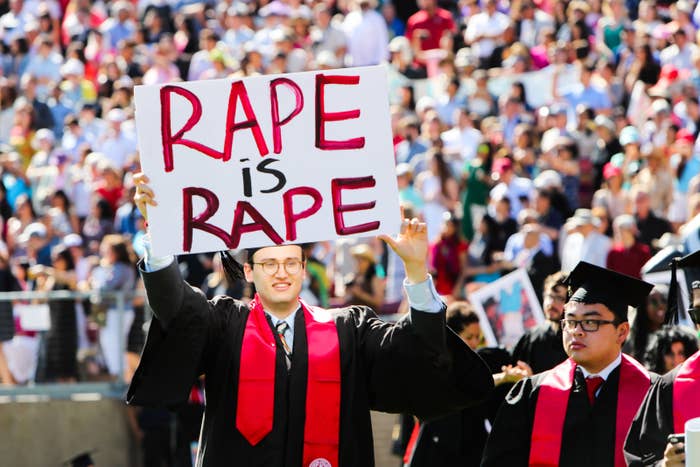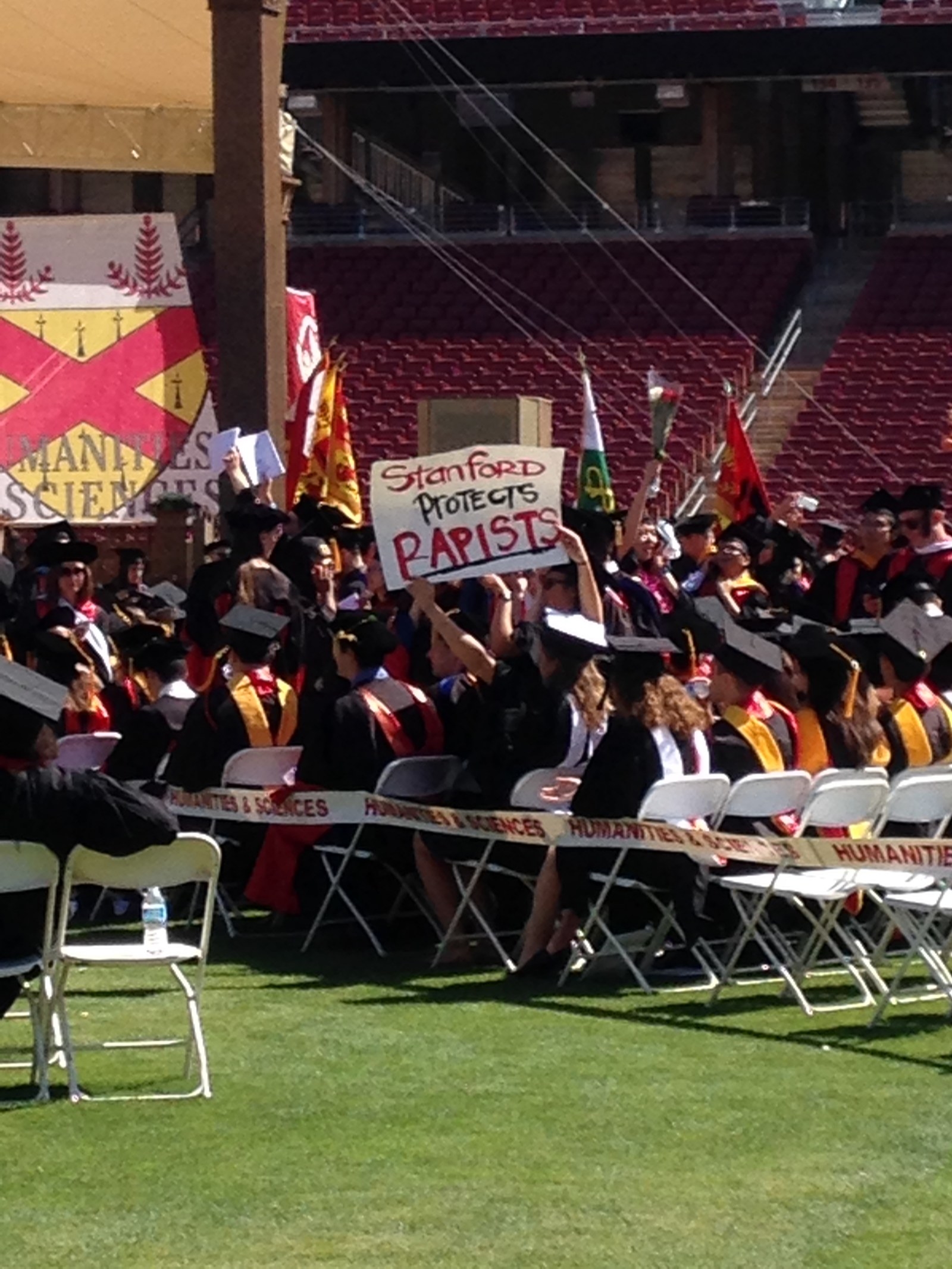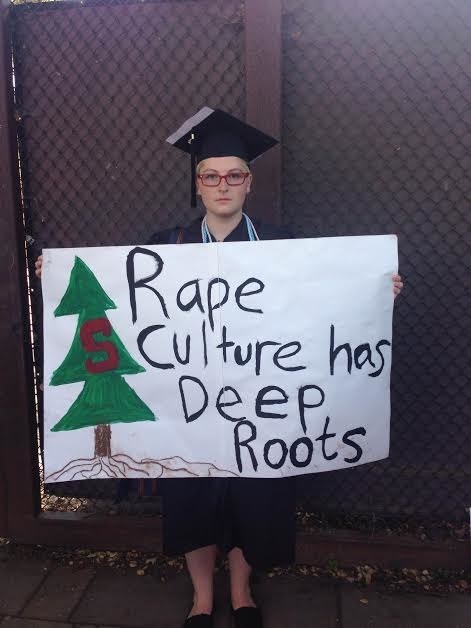
PALO ALTO, CALIFORNIA — The Brock Turner sexual assault case was barely mentioned explicitly at Sunday’s Stanford University commencement, but its presence was everywhere you turned: in signs held by student protesters, in the careful words of commencement speakers, and even, for a few hours, in the sky over Stanford Stadium.
In March, a jury convicted Turner of three counts of sexually assaulting an unnamed, unconscious woman behind a dumpster on the Stanford campus in January 2015, when he was a freshman. (Turner, who was on the university's swim team, subsequently withdrew from school.)
Although Turner faced up to 14 years in state prison, Santa Clara judge Aaron Persky sentenced him on June 2 to six months in county jail and probation. The judge said in court that a longer prison sentence would have a “severe impact” on Turner.
On June 3, BuzzFeed News published the letter the assault’s survivor read Turner in court. By the next week, as undergraduates were sitting for final exams, more than 16 million people had read the letter, Turner's case had become a national story, and a movement had been launched to recall Persky.
At 7:30 a.m. PT on Sunday, a scrum of reporters had gathered near the entrance to Stanford’s football stadium; each was given a sheaf of papers containing several press releases about the Turner case and, more broadly, the university’s position and action on sexual assault. A uniformed staffer told BuzzFeed News it was the biggest press crowd she’d seen at commencement since Chelsea Clinton graduated in 2001.
Around 8 a.m., a plane chartered by the feminist organization UltraViolet began flying overhead, hauling a banner that read “PROTECT SURVIVORS, NOT RAPISTS #PERSKYMUSTGO” in cardinal red.
Plane w/ banner over Stanford Univ. commencement: protect survivors not rapists,#perskeymustgo
UltraViolet also took out a full-page color ad with the same message in the commencement edition of the Stanford Daily, copies of which were stacked high on folding tables and clutched under the arms of visitors.
At 9:20 a.m. or so, students began filing into the stadium for “Wacky Walk,” a long-standing tradition in which outgoing seniors mill about the football field in elaborate group costumes, mugging for the cameras and looking for their loved ones in the stands. Among the flappers and superheroes and Harry Potters and Pokémon was graduating senior Paul Harrison, who was costumeless and carrying a sign that said “Rape Is Rape.”
“This is about making a stand against the judicial system,” Harrison told BuzzFeed News, calling Turner’s six-month sentence “scandalous.”
Elsewhere during the walk, a handful of students, mostly female, held signs with messages such as “It doesn’t matter what she was drinking,” and “Justice for Survivors, Not Leniency for Rapists.”
#20MinutesOfAdvocacy
Many had written “1/3” on their mortarboards, in reference to a widely circulated statistic that one in three female, transgender, and gender-nonconforming Stanford students will be assaulted in their time there.
As the graduates settled into their seats and “Pomp and Circumstance” began playing, a female master’s student raised a sign that said “Stanford Protects Rapists” and held it aloft for several minutes, over the sea of black caps.

As the ceremony began, President John Hennessy, who is leaving his post this summer after 16 years, called for a moment of silence “in solidarity with and support for the thousands of survivors of sexual and relationship violence,” as well as the victims of Saturday night's Orlando nightclub shooting.
“As events on our own campus and around the world remind us, violence in all forms has become a scourge in our society,” Hennessy continued, not explicitly naming Turner or mentioning his case specifically.
Documentarian Ken Burns, the commencement speaker, also made an oblique reference to the case, imploring seniors that “If someone tells you they’ve been sexually assaulted, take it 'effing seriously. And listen to them! Maybe, some day, we will make the survivor’s eloquent statement as important as [Martin Luther King Jr.’s] Letter from a Birmingham Jail.”
Toward the end of the ceremony, Hennessy briefly thanked the two graduate students who intervened in the Turner assault, calling them “heroes.”
Michele Dauber, a Stanford law professor and family friend of the survivor who is spearheading a campaign to recall Persky, told BuzzFeed News that the student protests at the commencement were “really unusual.”
“We don’t get student protests at Stanford,” she said. “Students at Stanford are very conservative — it is not a school known for activism. So for students to launch a campaign like this …. I read this as a sign of the total lack of confidence or trust in the administration. I would say trust is at an all-time low.”
Incoming junior Stephanie Pham echoed these sentiments, telling BuzzFeed News that “the administration has shown that it does not support the health or well-being of survivors” of sexual assault.
“Never have students been in this much agreement about anything,” Pham said. “It’s been remarkable. There’s just an overwhelming frustration and a desperate call for change.”
Violet Trachtenberg, a 21-year-old senior originally from Portland who helped organize the Wacky Walk’s protesters, told BuzzFeed News the case had haunted her. “It’s scary to know the powerful places Stanford students will go, and it’s scary to know that there are people graduating on Sunday who don’t know about consent," she said. "There are Brock Turners walking across the stage [at commencement.]”
“Most Stanford students are not supportive of activism,” Trachtenberg said. “People think protesting is ungrateful. I think it’s the opposite. It’s how we show we care. This is about holding the institution, which has given me so much, accountable for the violence it enacts and the violence it condones.
“I consider this my final act of love for Stanford.”

